Most law firms typically get an average of 60 to 80 leads per month. Do you fall below this number?
If so, you’re actively missing cases and likely handing over that $5,000+ legal fee to a competing lawyer in your neighborhood.
In today’s game, it doesn’t matter if you’re the best lawyer in town — if no one sees you, you don’t exist. Attention is everything, and law firms that implement digital strategies like SEO routinely experience a 53% increase in leads.
In this article, we break down 7 tactical digital systems to attract, convert, and close high-value legal clients. P.S. This is exactly how law firms like Stracci Law Group achieved a stunning 1,591% boost in qualified leads!

THE FOUNDATION – What Is Lead Generation for Law Firms?
Lead generation for lawyers is the process of attracting and converting strangers into potential clients, namely people who might hire your firm. That could mean they fill out a contact form, schedule a consultation, call your office, or download a legal guide from your website.
But here’s the kicker: Not all leads have the same value, and without a repeatable system to sort them, you’re flying blind, burning time on the wrong people, and leaving money on the table.
The Sales Funnel: Your New Best Friend
The lead generation process doesn’t happen by magic, it’s a well-thought-out funnel. And every step of that funnel must be dialed in:
- Awareness – They Google “family lawyer near me” or scroll past your Instagram video. You just entered their world.
- Interest – They click your ad, read your blog, or check out your reviews.
- Decision – They compare your firm to competitors. Your website, your offer, and your authority must do the heavy lifting here.
- Action – They book a consult, fill out a form, or call your office.
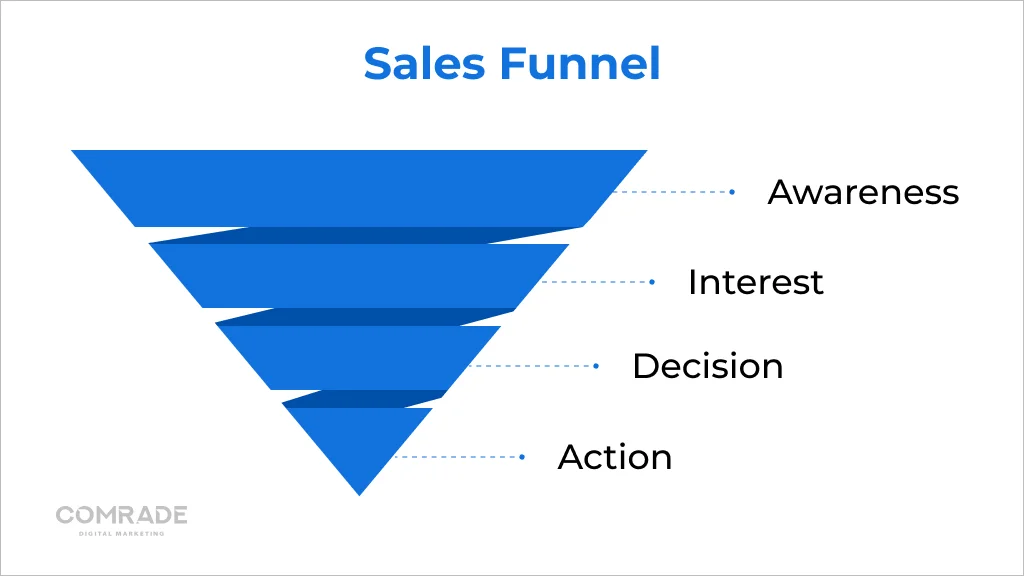
Clio’s Legal Trends Report reveals that 57% of legal clients hired the first lawyer they spoke to. If you’re not capturing attention early and making it effortless to take action, you might never hear from them.
Qualified vs. Unqualified Leads: Know the Difference
You don’t want more leads. You want the right leads. You could have 100 people calling your office this week, but if they’re asking about divorce when you handle business law, it’s just noise. What you need are qualified leads — the kind that are ready to hire you.
Qualified leads are people actively seeking legal help in your niche and area and are ready to engage. These people:
- Know they need a lawyer and they’re actively looking.
- Fit your practice area (you do criminal defense, they need criminal defense help).
- Are local to your jurisdiction.
- Understand that legal help costs money, and they’re ready to invest.
- Willing to book a consult now, not “maybe next month.”
Unqualified leads are tire-kickers, wrong practice area, wrong budget, or not serious. They are:
- Random browsers looking for free advice.
- Out-of-area prospects you can’t legally serve.
- Folks with no budget, no urgency, or just shopping around.
- Leads meant for another practice area entirely.
In fact, law firms find that only 27% of their leads are qualified and sales-ready. So remember, there’s a massive difference between traffic and traction.
Want more of the right clients, not just more noise? Our 2025 client acquisition guide is a must-read for ambitious lawyers!
And with that said, let’s dive into the 7 proven steps to help your firm gain highly qualified leads in 2025.
1. TRAFFIC — Get More of the Right People to Find You
Generating leads starts with generating traffic. And traffic isn’t just about being seen; it’s about being seen by the right people, at the right time, with the right message.
When your traffic strategy is on point, your ideal clients find you, not the other way around.
Let’s unpack the 3 core channels top law firms use to consistently drive the right traffic that converts:
A. Search Engine Optimization (SEO) to Generate Leads
93% of online experiences begin with a search engine. This is why your search engine rankings for commercially relevant high-intent keywords are so important.
What does this mean? Well, if your firm isn’t showing up in Google’s organic search results when someone searches “business attorney near me” or “best family lawyer in Dallas,” you’re losing leads every day.
Here’s how to do SEO the right way:
1. Keyword Strategy & On-Page Optimization
- Use tools like Ahrefs, SEMrush, or even Google’s own “People Also Ask” to find high-intent keywords.
- Optimize pages for specific services (e.g., estate planning lawyer, LLC formation attorney) with clear, benefit-driven headlines, metadata, and internal links.
- Create dedicated landing pages for your key practice areas to boost the likelihood of showing up on the search engine results page.
2. Local SEO & Google Business Profile Optimization
- Claim, verify, and optimize your Google Business Profile (GBP)
- Add relevant categories, practice areas, service descriptions, hours, and location-specific keywords
- Collect and respond to real reviews — they’re trust-building gold
- Post regularly to your GBP to signal activity to Google
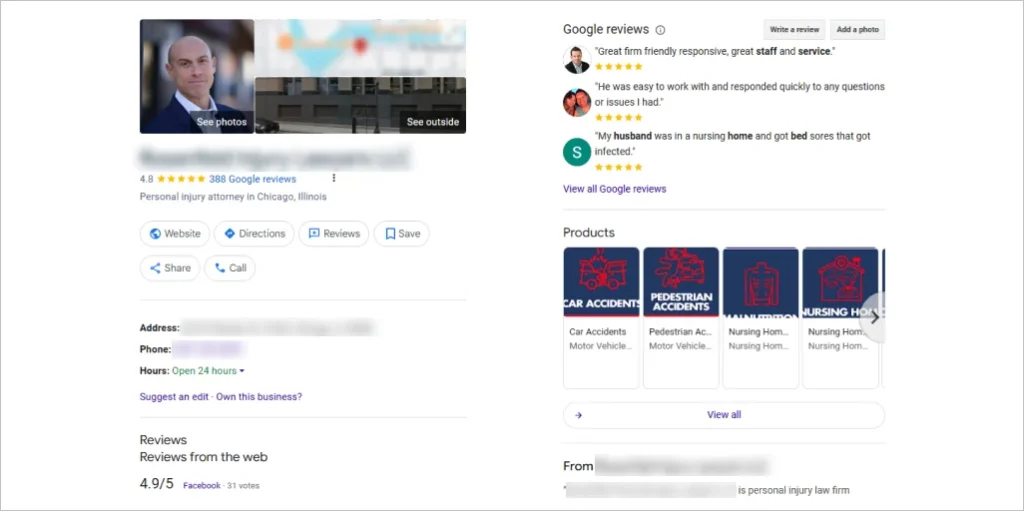
Firms that invest in local SEO could see 2x more local traffic and 4x more inbound calls within 3 to 6 months.
And the numbers back it up.
When Hodgson Law Offices, a family and divorce firm in Spokane, WA, had us revamp their site and pair it with a focused SEO strategy, the shift was massive. In just 6 months, they saw a 440% jump in qualified leads, cut their cost per lead by 62%, and boosted organic traffic by 2,715%. Same legal team. Same expertise. But they now had a site and search presence that brought the right clients to their door.
B. Pay-Per-Click Ads (PPC) to Capture Leads
Did you know that PPC visitors are 50% more likely to convert than organic visitors?
Unlike SEO, paid ads bring instant visibility. It can be a money pit if done wrong, or a goldmine if done right. Unlike pay-per-lead ads, you own the traffic, control the targeting, and aren’t competing against three other firms for the same lead.
1. Google Ads vs. Local Services Ads (LSAs)
- Google Ads lets you target relevant keywords like “immigration lawyer Los Angeles” with custom headlines and landing pages.
- Local Services Ads (LSAs) put your firm above traditional search ads, displaying reviews and contact options directly, making it ideal for urgent legal needs.
- LSAs charge per lead, not per click, making them more efficient for law firms in competitive markets.
2. Targeting, Budgeting & ROI Tracking
- Start with a $500–$1,000 test budget and split-test 2–3 ad sets.
- Geo-target your city or region to avoid wasting ad spend.
- Use conversion tracking (via Google Tag Manager or CallRail) to see which keywords drive booked consults.
Go a step further and explore radio and TV commercials! Check out the 12 best-performing lawyer commercials that actually convert.
C. Social Media Legal Marketing
54% of people use social media to research products and services.
But the problem is, most lawyers ignore social, making it a costly mistake. It’s not just for teenagers or TikTok dances. It’s about building trust before someone ever needs a lawyer. Social media platforms are a great place to start.
1. Facebook/Instagram for Brand Awareness
- Post short legal tips, bust common myths, or answer FAQs.
- Run “behind the scenes” social media posts and introduce team members to humanize your brand.
- Use boosted posts to amplify reach in your local area.
2. Paid vs. Organic
- Organic social media marketing builds trust over time.
- Paid social media channels build instant visibility, especially for niche services like “trademark attorney” or “DUIs in [city]”.
- Start with retargeting ads to people who visited your website or engaged with your content.
3. Retargeting Prospects
- Follow up with “warm traffic” — those who watched a video or clicked your ad.
- Use tools like Meta Pixel to show tailored follow-ups.
- Example: Someone watches your “What to do after an accident” reel → You retarget with a CTA to book a free consult.
Pro Tip: Content doesn’t need to go viral. It just needs to show up consistently, so when someone does need a lawyer, your name is the first they remember. And remember, it’s crucial to have targeted online advertising campaigns to bring in the right kind of leads.
Tired of wasting money on a dead marketing strategy? Read our 2025 Law Firm Marketing Playbook and get the exact strategies we use to 4X ROI and bury the competition.
2. TRUST — Position Your Legal Practice as the #1 Choice
In saturated legal markets, being good isn’t enough. You need to be trusted. And in the digital era, trust is built long before someone picks up the phone.
Let’s look at how to build your law firm’s reputation. By the time prospects are ready to act, the decision will feel inevitable.
A. Content Marketing
While there are many pointless marketing efforts, content isn’t one of them. Think of it more like your 24/7 salesperson. If done right, it educates, pre-qualifies, and nurtures potential leads before you speak to them.
1. Blog Posts, FAQs, and Downloadables
Create content for your law firm’s website that addresses specific legal concerns your potential new clients are Googling right now.
- Blog titles like “Do I Need a Business Attorney for an LLC?” or “What Happens After a Car Accident in Texas?” rank for search and build trust.
- Frequently Asked Questions (FAQs) improve law firm SEO and reduce friction during the intake process.
- Downloadable resources like checklists, PDF guides, or “What to Do Next” one-pagers double as lead magnets when paired with email opt-ins.
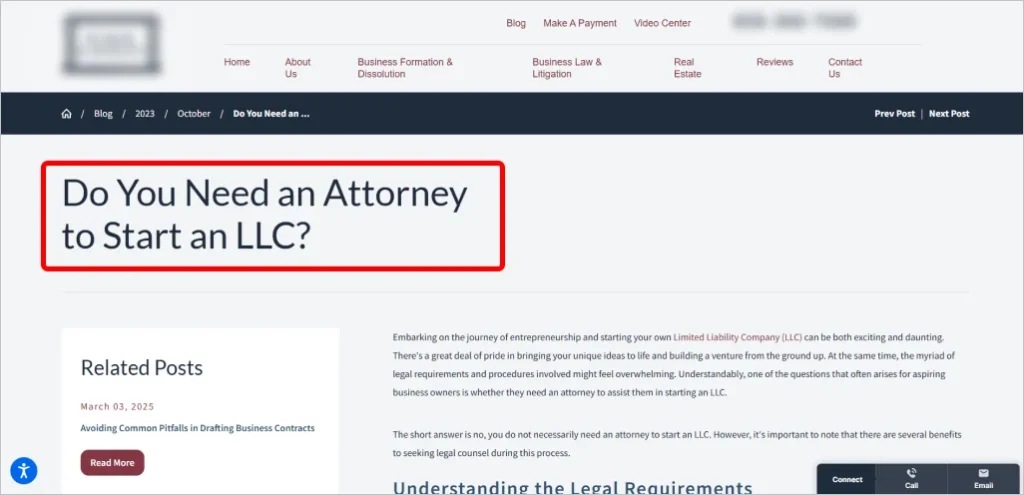
Pro Tip: Every blog post should have a clear next step, either a CTA to schedule a consult or an offer to download a free resource.
Want a proven strategy to attract more clients online? Read our guide on content marketing for law firms to see what actually works in 2025.
2. Authority Stacking Through Education
Content positions your firm as a thought leader in your practice area. The more value you give, the more credibility you earn.
- Share case studies (with anonymized details) showing how you’ve helped past clients.
- Write in-depth pieces on emerging legal trends or state-specific law changes.
- Include quotes or citations from well-known legal sources to elevate perceived authority.
Clients want proof that you know your stuff before they ever reach out. Give it to them.
3. Video Content for Visibility and SEO
Short, value-packed videos amplify trust faster than text alone. They also increase your website’s dwell time, which improves SEO.
- Answer common legal questions in 1–2 minute clips.
- Add videos to your service pages to improve engagement.
- Post videos on YouTube and embed them in blog posts or emails.
Video helps prospective clients see you as a real person — confident, knowledgeable, and human.
Want to make a lasting impression before the first consultation? YouTube is your next step! Learn how to use high-impact video marketing to attract paying clients.
B. Email Marketing Campaigns
If your law firm’s emails are sitting unopened, it’s not because email is dead. It’s because the wrong people are on the list, or you never gave them a reason to care.
1. List Building 101: Lead Magnets & Opt-Ins
To build an email list that converts, you need to give value upfront.
- Create opt-in offers like “7 Things to Do Before You File for Divorce” or “Free Business Formation Checklist”.
- Pair opt-ins with high-traffic blog posts or landing pages.
- Make sure forms are simple and embedded across your site — no more than their name and email to start.
The goal here is to trade value for contact info and build a list of people genuinely interested in your services.
2. Automated Sequences to Attract Warm Leads
Once someone opts in, they should enter a welcome sequence — a set of automated emails that educate and build trust.
- Email 1: Welcome and what they can expect
- Email 2: Your story or a powerful case study
- Email 3: Answer a common objection or question
- Email 4: Invite them to book a consultation
Each email should do one thing: move the reader one step closer to working with you.
3. Follow-Ups That Actually Convert
Many lawyers send one email… maybe two, then go silent. That’s a huge mistake!
- Use automated reminders for unbooked consultations.
- Segment your list by interest (family law, personal injury, business law) to send more relevant messages.
- Send monthly newsletters that blend education with subtle CTAs.
Clients don’t always convert on the first touch. But firms that follow up consistently see up to 70% higher conversion rates.
3. CONVERSIONS – How to Capture & Convert Quality Leads
Attracting website visitors is only half the game. The real win is turning that attention into booked consultations. That doesn’t happen by accident — it happens through intentionally built conversion assets.
Without these in place, all the SEO, ads, and content in the world won’t matter. Traffic will come in and leak out.
A. High-Converting Websites: Design, Speed, Structure
Keep in mind, optimizing your website is a multi-step process as it serves as your closing table.
- Speed matters: If your site takes more than 3 seconds to load, you’re losing up to 40% of your traffic before they even see a headline.
- Structure matters: Each page should answer one question and move the visitor toward one action. Confused users don’t convert.
- Design matters: Clean, professional, and distraction-free wins. Ditch the generic stock photos and focus on clarity, credibility, and confidence.
According to a Clio study, 38% of legal clients said they chose a firm based on website design alone.
Trust and estate litigation firm, Barr & Douds, saw this firsthand. When Comrade redesigned their website, the impact was dramatic. With a faster load time, streamlined structure, and a professional, conversion-focused design, the firm achieved a 937% increase in qualified leads, an 87% decrease in cost per lead, and a staggering 4,774% boost in organic traffic, proving that the right website can be a powerful conversion engine.
B. Calls-to-Action, Forms, and Mobile-First UX
Most users won’t scroll. They’ll skim, and if they don’t see what to do next, they’ll bounce, and you’ve lost their business.
- Clear CTAs on every page: “Schedule a Free Consultation”, “Book a Strategy Call”, or “Request a Case Review”.
- Short forms that only ask for essential info — name, email, phone, and legal issue. No one wants to fill out a 12-field form.
- Mobile-first design: Over 60% of legal traffic happens on mobile. Your buttons, forms, and text must work flawlessly on a phone, or you’re leaving leads on the table.

Every page should make it obvious and effortless to take the next step.
Just look at Sequoia Legal, a top-tier business law practice in Denver. After redesigning their site with faster load times, simplified navigation, and mobile-optimized forms, the results were impossible to ignore. They saw a 138% increase in qualified leads, a 57% drop in cost per lead, and an eye-popping 6,700% surge in organic traffic. But one of the biggest wins? A drastically improved bounce rate, because when users stick around, they convert.
C. Landing Pages Tailored to Specific Ads
If you’re running paid advertising campaigns or promoting a specific service, don’t send users to your homepage.
Create dedicated landing pages for each offer or ad campaign:
- One page. One purpose.
- Strip out distractions — no navigation menus, no outbound links
- Match the headline, language, and offer from the ad that brought them in
- Include testimonials or trust elements (bar certifications, local awards, etc.)
This one change alone can double your conversion rate, especially for PPC ads traffic.
Stop letting potential clients slip through the cracks. Learn how to turn more website visitors into paying clients with our proven CRO strategies.
D. Live Chat, Chatbots, and 24/7 Engagement
Not every lead wants to call or fill out a form. Some just have a question or need reassurance. That’s where chat comes in.
- Live chat converts 2x better than static forms alone, especially after hours.
- AI-powered chatbots can pre-qualify legal leads by asking a few simple questions.
- 24/7 availability means you capture leads while your competitors are sleeping.
Platforms like Smith.ai or Intercom integrate easily into legal websites and can be the difference between a booked consult and a lost lead.
You could see a 48% boost in revenue and a 40% increase in conversion rate by using Live Chat! After all, the modern prospect expects immediate access. If you can’t provide it, someone else will.
And when your website acts like a conversion machine, you won’t have to chase clients. They’ll come to you.
4. OLD-SCHOOL TRICKS — Traditional & Referral Marketing Still Work
In the era of TikTok ads and AI chatbots, it’s easy to forget: people still hire people they trust. And often, that trust is borrowed from someone else — whether it’s a friend, a professional contact, or a client you helped six months ago.
The firms that win big don’t ignore these old-school tactics. They systematize them.
A. Community Events & Local Networking
Yes, showing up still matters!
You’re building recognition and affinity when you’re present in the community, whether it’s sponsoring a charity golf event, giving a legal workshop, or simply shaking hands at a local business meetup.
- Partner with chambers of commerce, small business groups, or real estate offices.
- Offer to host or co-host free legal Q&A nights or “Ask an Attorney” events.
- Show up where your ideal clients already are, not just where other lawyers hang out.
Real-world visibility positions your firm as embedded, accessible, and credible. That’s priceless when someone needs legal help fast.
B. Build Referral Relationships with Other Professionals
Not every lead will come from a client. Some of the most consistent, qualified referrals come from other trusted professionals. Here’s where to start:
- CPAs and financial planners (great for estate, tax, and business law).
- Therapists or counselors (ideal for family, custody, and divorce lawyers).
- Real estate agents and mortgage brokers (perfect for property law or real estate attorneys).
- Other attorneys in different practice areas; form non-competing alliances.
Make it easy for them to refer you:
- Create a “referral sheet” that outlines your services, ideal client types, and contact info.
- Offer co-marketing opportunities (webinars, joint blog posts, etc.).
- Follow up and keep them updated when they refer someone — it builds trust and reciprocity.
According to LawRank, firms with established professional referral pipelines close up to 45% more high-ticket clients without spending a dollar on ads.
C. How to Ask for Testimonials & Reviews (Without Sounding Desperate)
Most lawyers hope clients will leave a review, but smart firms ask, and they do it with intention.
- Ask when the client is most satisfied (usually right after a win or resolution)
- Be direct but grateful: “Your feedback helps more people find the help they need — would you be open to leaving a quick review?”
- Provide the link directly, and make it mobile-friendly
- Encourage specifics: what the client was dealing with, how you helped, and what the outcome was
Use these reviews in more than one place:
- Google Business Profile
- Website testimonials page
- Embedded into landing pages and email funnels
- Even short quotes inside your proposal PDFs
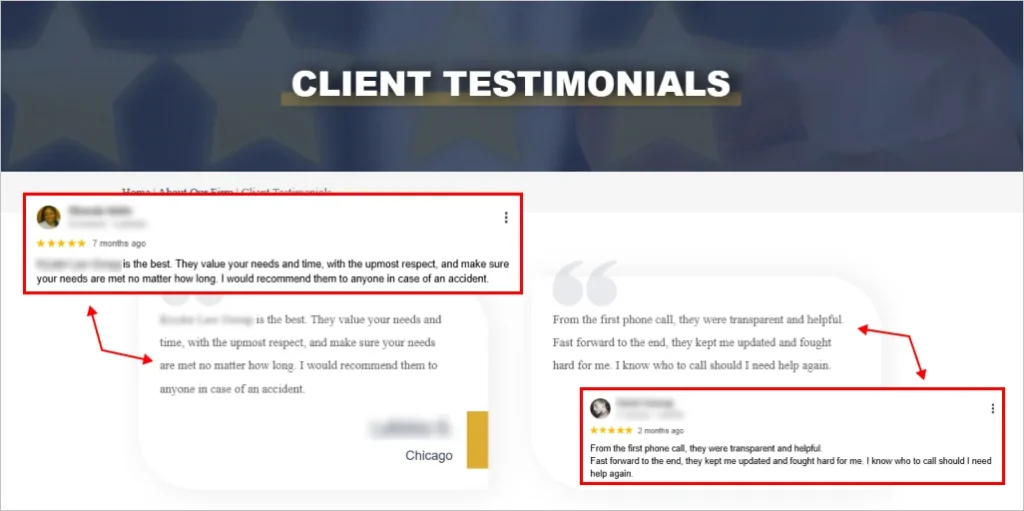
Nothing builds instant trust like seeing someone who’s already walked the path and won with your help.
We know that these lead-gen tactics may not seem glamorous, but they work. And when layered on top of your digital strategies, they add a level of credibility no ad can match!
5. LEAD GENERATION COMPANIES — Should You Buy Leads?
Not every firm has time to build an in-house content machine, run PPC campaigns, and work on SEO. That’s where lead generation partners come in — agencies and third-party vendors that deliver leads straight to your inbox.
Sounds great, right? It can be. But it can also burn cash and kill the growth of your law firm online if you don’t do it right.
A. Should Law Firms Buy Leads?
The Pros:
- Speed – Leads come in fast, usually within days of campaign launch.
- Simplicity – You don’t need to manage ads or write content.
- Scalability – Easy to increase lead volume by raising your spend.
The Cons:
- Quality varies – Many leads are cold, generic, or poorly matched.
- Lack of exclusivity – You may be sharing leads with multiple firms.
- Less control – You don’t own the target audience or the platform.
The biggest risk? Relying on a lead source you don’t control. Bought leads can supplement your strategy, but they should never be your only one.
B. How to Vet Third-Party Lead Vendors
Before you sign anything, ask the hard questions:
- Are leads exclusive or shared? Shared leads mean competition from the moment the phone rings. Insist on exclusive leads.
- What’s the source of the lead? Are they running ads, scraping lists, or buying from brokers?
- Do they pre-qualify leads? If not, prepare to waste time.
- Can I listen to recorded calls or see sample lead data? If they hesitate, you walk.
- What’s the return/refund policy? Reputable vendors will replace low-quality or bogus leads.
And most importantly: talk to other firms who’ve worked with them. Ask what percentage of leads turned into clients.
C. Integrating Bought Leads into Your CRM & Marketing Flow
Getting the lead is just step one. What happens next determines if that lead becomes a client or goes cold. Here’s how to make sure you’re ready:
- Route leads instantly into your CRM (Clio Grow, Lawmatics, etc.).
- Tag and track the source of each lead so you can measure ROI.
- Build automated follow-up sequences (email, SMS, or call reminders) that kick in immediately.
And remember, lead generation companies won’t nurture your leads. That’s your job. Build systems that follow up fast, personalize every interaction, and keep the prospect moving toward a booked consultation.
Work smarter, not harder. Discover the 10 best CRMs for law firms in 2025 and find the right tool to streamline your practice and scale client relationships.
6. RELATIONSHIP MANAGEMENT — Don’t Lose the Leads You Paid For
Digital lead generation doesn’t stop when someone fills out a form or calls your office. That’s when the real conversion work begins. This is the moment where deals are won — or silently lost.
If your intake is slow, inconsistent, or impersonal, you’re handing business to firms that follow up faster, sound more competent, and make clients feel like a priority.
A. Streamlining the Intake Process
Think of intake as your front door. It better be clean, open, and easy to walk through. Here’s how to do it right:
- Simplify your forms: Don’t overwhelm new leads with 15 questions. Ask only what’s necessary to qualify and book a consult.
- Standardize responses: Whether it’s a receptionist, intake coordinator, or virtual assistant, everyone should follow the same process.
- Scripted responses: Create call/email/SMS templates that clearly explain next steps, build confidence, and remove uncertainty.
- Immediate next steps: Every lead should leave the first interaction knowing what happens next, and when.
A staggering 27% of law firms do not respond to their online leads. Time kills interest. The longer it takes you to respond or set an appointment, the colder the lead gets.
B. Use a CRM to Track Every Lead and Every Follow-Up
If you’re still managing prospects through sticky notes, spreadsheets, or a cluttered inbox, it’s time to level up.
A proper legal CRM (like Clio Grow, Lawmatics, or HubSpot) helps you:
- Tag and segment leads by source, practice area, or urgency.
- Set automated reminders to follow up after X days for missed consults.
- Track communications so you know who’s been contacted and who’s gone dark.
- Generate reports to measure which marketing channels bring the most profitable clients.
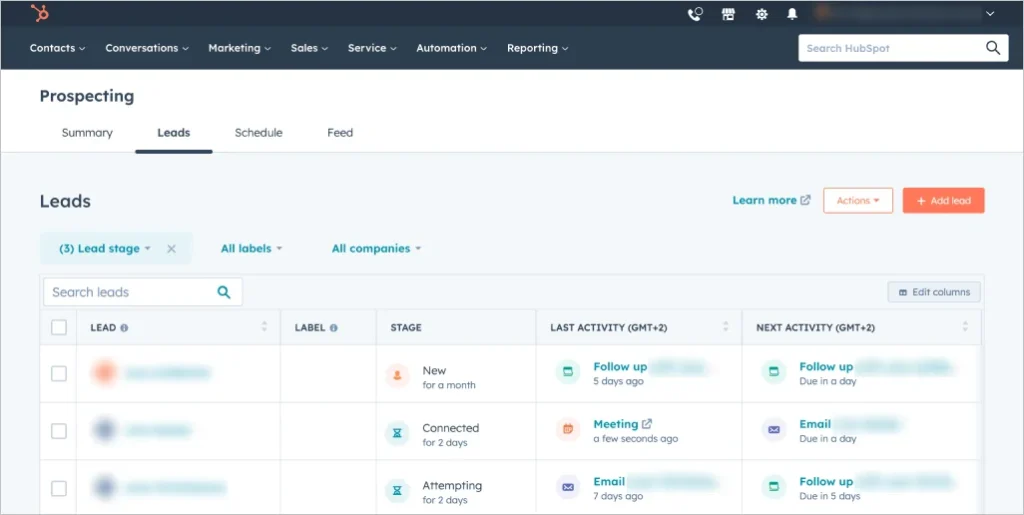
A CRM gives you more control. After all, you can’t improve what you don’t track.
C. Personalization That Builds Trust and Converts
Today’s prospects are comparison shopping. They’re judging how you respond, not just what you say.
Personalization isn’t about using someone’s first name — it’s about making them feel understood.
- Reference their legal issue directly: “I saw you mentioned you’re dealing with a breach of contract — we handle cases like this often.”
- Send short follow-up emails that sound like a human wrote them, not a bot.
- Include a case study or short testimonial relevant to their situation.
- Use intake questions to reflect their language and urgency back to them.
The faster you build rapport, the faster they’ll choose you over your competitors in the legal industry.
7. LEVERAGE AI – Automate Lead Generation for Lawyers
There are two types of law firms right now: the ones still doing everything manually… and the ones using AI to generate, nurture, and convert leads on autopilot.
The difference? One is hustling. The other is scaling.
AI isn’t here to replace you — it’s here to remove the bottlenecks, so you can focus on what matters: closing cases and serving clients.
See how top firms are using artificial intelligence to work smarter, scale faster, and serve clients better.
A. AI Tools for Ad Copy, Email Sequences, and CRM Workflows
Creating content, emails, and follow-up systems used to take hours. Now? You can generate and deploy them in minutes with the right tools.
- Ad copy: Tools like Jasper, Copy.ai, or ChatGPT can generate variations of high-converting Google or Facebook ad copy tailored to specific legal services.
- Email sequences: Use AI to build out multi-step nurture flows for cold leads, missed consults, or reactivation campaigns.
- CRM workflows: Platforms like Lawmatics and HubSpot are now embedding AI to auto-build workflows based on how leads behave (e.g., if a lead clicks but doesn’t book, send a follow-up 24 hours later).
AI gives you volume without sacrificing quality, and it scales as you grow.
B. Predictive Lead Scoring & Segmentation
One of the most powerful uses of AI in lead gen is knowing which leads are worth your time and which aren’t.
- Predictive lead scoring: Uses behavioral and demographic data to rank leads based on likelihood to convert.
- You can set up automatic rules: High-score leads get immediate human follow-up; low-score leads enter a long-term nurture sequence.
- Segmentation becomes effortless: group leads by case type, urgency, source, or engagement level, and trigger smart sequences accordingly.
The result? You stop wasting time on tire-kickers and start focusing on leads that are ready to move.
C. Smart Intake Bots and AI-Enhanced Client Onboarding
Imagine a system that can pre-qualify leads at 2 a.m. while you’re asleep — asking the right questions, collecting the right info, and scheduling a consult automatically.
That’s what smart bots and AI-powered intake systems do.
- Chatbots like Smith.ai, Drift, or Tidio can be trained to ask legal-specific intake questions and determine eligibility.
- They can connect directly with your calendar to book consults without back-and-forth.
- AI-enhanced onboarding systems can even prep initial case files, pre-fill CRM fields, and send tailored onboarding emails based on the client’s issue.
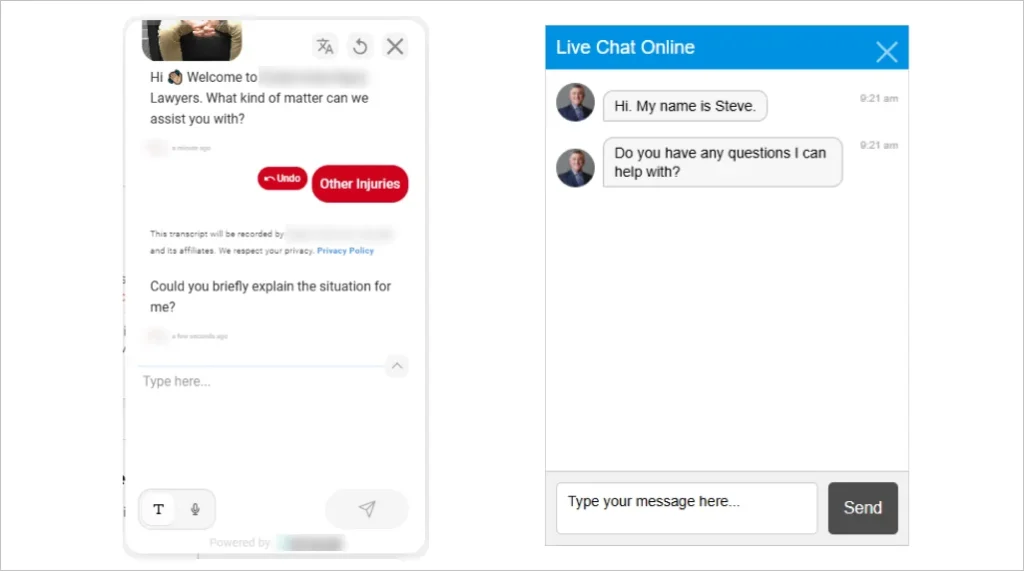
AI is rewriting the rules of legal work. Explore the 25 best AI tools for lawyers in 2025 and see how to streamline your practice, boost accuracy, and stay ahead of the curve.
You Don’t Need Another Job. You Need a Lead-Gen System to Get Top-Dollar Clients.
You didn’t become a lawyer to spend 50+ hours a week doing SEO, writing time-consuming emails, or managing ad campaigns.
But here’s the reality — right now, you’re invisible online, and you’re losing leads rapidly.
One missed case? That’s $5,000–$100,000+ gone. Ten in a month? You’re leaking six figures a year.
Let’s fix that. Comrade Digital Marketing Agency has 15+ years of experience in building proven, automated systems designed to keep your pipeline full — even while you’re in court, at home, or off the clock. The result?
- Up to 1,018% more qualified leads
- Up to 400% ROI
- 100% transparent reporting to track where every dollar goes
Don’t let a lack of leads kill your business. Get attorney lead generation services you can trust. Book your free strategy session today.
Lehmbecker Law Boosts Qualified Leads by 1,425% with Comrade!
When this top Seattle personal injury firm launched a redesigned website supported by targeted SEO and digital campaigns, the growth was massive:
- 1,425% increase in qualified leads
- 1,067% surge in organic traffic
- 645% return on marketing investment
Ready to see results like these? We’re your go-to attorney lead generation experts!
Contact us today to build a lead-gen system that doubles your revenue.
